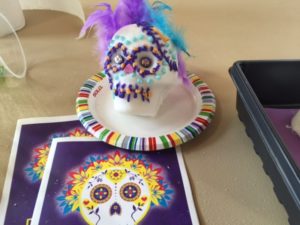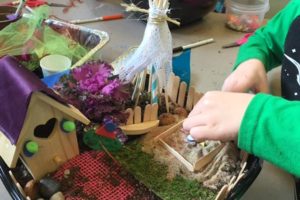Workshop Overview
The Denver Botanic Gardens offers 5-10 Family Workshops per year, each with a different theme. Running for two hours, the workshops require preregistration which helps determine how many materials are necessary. The programs cost between $10-$12 for adults and $15-$17 for kids (member and non-member pricing), and a confirmation email provides adults with all of the information they need to know prior to their visit. The multi-sided set-up with about six 8-foot tables allows two to three family groups to gather at each table. Materials are put out on the tables to share. Themes are seasonal or relate to a distinctive exhibit. Projects have included fairy gardens in January, chocolate making in February, sugar skulls in October and gingerbread houses in December.
Workshop Description
Each workshop begins with a brief introduction of the workshop topic by a Gardens educator. The rest of the time, families are engaged in hands-on exploration, conversation, and project creation. After some early prototyping, educators realized that families wanted to get started right away, so they reduced the amount of formal instruction. Families are excited to dig right in and get their hands dirty. Volunteers and educators float around the room, helping with the distribution of materials and offering further information and assistance. Families who are interested in more in-depth content can talk one-on-one with the volunteers and educators. Projects are based on a theme, but are intentionally multi-outcome to let kids and adults be creative and personalize projects to their unique style. The projects may be more complex than people anticipate, but they are definitely doable. A messy table at the end of the session is an indication of success. At the end of the workshop, educators and volunteers encourage families to explore the Gardens and galleries to find the connections between what’s on view and what they just made.

Distinctive Themes
Since the workshops take place in a garden setting, the projects always have some connection to plants. For example, for the gingerbread houses, facilitators show the plant-based spices that are used in baking gingerbread. Educators have designed the program to be authentic by incorporating actual plants wherever they can. They also bring in multisensory components when they break open a cocoa pod and taste the beans for the chocolate-making activity, or smell different spices for the gingerbread houses. The big takeaway from the workshops is that plants are important and relevant parts of our everyday lives.
Facilitating Learning for All Ages
The activities are great for all ages and multiple users. Families are welcome to stay for the whole two hours but if there are younger kids who finish early, they can leave at any time. Older kids and adults tend to get really into the project and utilize the whole session. Volunteers and educators work to be accessible and accommodate families with multiple children by offering backup support for adults who might have their hands full with infant or toddler siblings. Educators hope adults will follow their child’s lead and let their child express him or herself. Families can have conversations about the choices they’re making on a project. If there is a more challenging element to the project, facilitators might say something like “This is going to be a hard part; you might need your grown-up’s hands to help you.” Materials such as knives are automatic cues for parents to pay attention.
Workshop Evolution
The Family Workshops have evolved over the years. Pricing used to be for an adult/child pair, but now adults and children are registered separately. This sets a multi-user expectation and lets adults know that they are going to play an integral part in the workshop. Adults can create their own project or work together with their child on one project. Charging the adults an admission also helps to offset the cost of materials. Educators have made changes by paying attention to their audience and observing families who have attended. Early on, educators ran the workshop for three hours but they realized that was too long, so they shortened it to two hours. They also cut back on the amount of time spent on direct instruction, giving families bits and pieces of content along the way to allow for more interaction between facilitators and families, as well as among families themselves. Families can ask questions and educators can suggest things to try at home. As educators, it can be hard to let go of the content, but they structure the workshop in an accessible and multi-modal way where they can share information with people who are old enough and who are interested in it, while offering a hands-on exploration or an immediate project for other learners. If other institutions are interested in running a similar family workshop, Denver Botanic Gardens recommends being flexible and understanding of your audience, and remembering that it’s ok to get messy!
Special thanks to Melissa Gula, Manager of Family and Children’s Programs at the Denver Botanic Gardens. http://www.botanicgardens.org/

